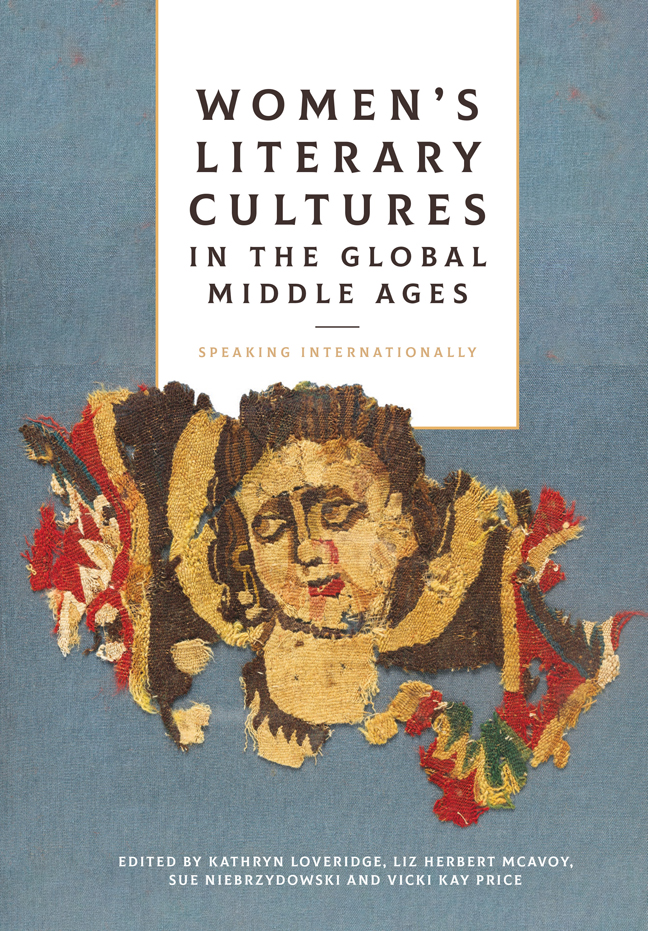Book contents
- Frontmatter
- Contents
- Foreword
- Acknowledgements
- List of Abbreviations
- Book part
- 1 Comparison and Dialogue
- 2 Constructing Gender and Genre
- 3 Saintly Performance and Marian Piety
- 4 Evidence and the Archives: Revisiting and Reconsidering
- Afterword: Intersectionality and Coalitions
- List of Contributors
- Bibliography
- Index
- Gender in the Middle Ages
Afterword: Intersectionality and Coalitions
Published online by Cambridge University Press: 09 January 2024
- Frontmatter
- Contents
- Foreword
- Acknowledgements
- List of Abbreviations
- Book part
- 1 Comparison and Dialogue
- 2 Constructing Gender and Genre
- 3 Saintly Performance and Marian Piety
- 4 Evidence and the Archives: Revisiting and Reconsidering
- Afterword: Intersectionality and Coalitions
- List of Contributors
- Bibliography
- Index
- Gender in the Middle Ages
Summary
DIALOGUES ACROSS SPACE AND TIME
Speaking Internationally makes three interventions in transnational approaches to women's literary culture. First, it recognises the importance of intersectional feminism; second, it demonstrates the vitality of comparative methods across space and time; and, third, it challenges the idea of what it actually means to speak—whether speaking is used as a discursive metaphor, or if audible speech and vocality is analysed as a historical phenomenon or an implied social norm. This afterword develops three thematic strands to explore interconnected histories of gender, language and disability. I consider how medieval literature and culture (broadly conceived) can change how modern readers and scholars understand identity, community and critical conversations across social groups today.
Intersectionality, first of all, is an analytical framework for addressing concurrent and interrelated systems of oppression. This mode of analysis derives from Black feminist thought, including formative works by Audre Lorde and Kimberlé Crenshaw, whose works of critical theory addresses how race and gender (in particular) operate simultaneously as structures of power and oppression. Building upon intersectional feminist approaches to cultural analysis, Carissa M. Harris reveals how the medieval European genre of the pastourelle exposes complex dynamics of social class and gendered power by depicting ‘well-off men targeting women who are young, poor, single, and alone’ and ‘leveraging the women's multiple disadvantages to coerce them’, but medieval poetry can also model compelling strategies of women's resistance to sexual violence. Extending this exploration of power and sexuality with notions of queer time and affect as theorised by Carolyn Dinshaw (also invoked by the co-editors in the introduction to this essay collection), Harris observes that anthologies of medieval lyrics voiced by women can create a ‘transhistorical affective space’ that builds empathy among readers past and present. It is precisely this kind of interpretive nexus – textual juxtaposition, cultural analysis, and attentive reading across time – that propels much of this volume.
As stated in the introduction, a collaborative analysis of medieval women's literary culture in and beyond European contexts can set textual traditions ‘in parallel’ – or, to adapt a phrase from Harris, create a transhistorical analytical space – that demonstrates Dinshaw's queer asynchrony of time.
- Type
- Chapter
- Information
- Women's Literary Cultures in the Global Middle AgesSpeaking Internationally, pp. 293 - 302Publisher: Boydell & BrewerPrint publication year: 2023



